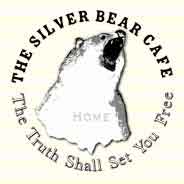

| Visitors Now: | |
| Total Visits: | |
| Total Stories: |

| Story Views | |
| Now: | |
| Last Hour: | |
| Last 24 Hours: | |
| Total: | |
Not Yours To Give – Col. David Crockett, US Representative from Tennessee

The Silver Bear Cafe
 |
|
Col. David Crockett
|
(Editor’s Note: The following was originally published in “The Life of Colonel David Crockett,” by Edward Sylvester Ellis. Please read this missive over and over until you understand and agree with it. Members of Congress have no right to breathe (metaphorically speaking) with out our permission. All the bailouts, as well as the special considerations, which include the compensation packages that they have”voted” for themselves, are illegal. These miscreants are criminal putzs that are pretending to “legally” pass unConstitutional abominations, and their actions are prosecutable. The sheeple out there that are completely dependent on these handouts are no longer capable of critical thought or being responsible citizens. Responsible citizens would insist that the criminals (both the banksters and the politicians) that were responsible for their hardships be prosecuted. If those sheeple have allowed themselves to be sufficiently “dumbed down” to no longer be willing to stand up for their rights, that is their problem, not ours. Our problem involves ridding America of the vermin that are criminal politicians. – JSB)
One day in the House of Representatives a bill was taken up appropriating money for the benefit of a widow of a distinguished naval officer. Several beautiful speeches had been made in its support. The Speaker was just about to put the question to a vote when Crockett arose:
“Mr. Speaker – I have as much respect for the memory of the deceased, and as much sympathy for the sufferings of the living, if suffering there be, as any man in this House, but we must not permit our respect for the dead or our sympathy for a part of the living to lead us into an act of injustice to the balance of the living. I will not go into an argument to prove that Congress has not the power to appropriate this money as an act of charity. Every member upon this floor knows it. We have the right, as individuals, to give away as much of our own money as we please in charity; but as members of Congress we have no right so to appropriate a dollar of the public money. Some eloquent appeals have been made to us upon the ground that it is a debt due the deceased. Mr. Speaker, the deceased lived long after the close of the war; he was in office to the day of his death, and I have never heard that the government was in arrears to him.
“Every man in this House knows it is not a debt. We cannot, without the grossest corruption, appropriate this money as the payment of a debt. We have not the semblance of authority to appropriate it as charity. Mr. Speaker, I have said we have the right to give as much money of our own as we please. I am the poorest man on this floor. I cannot vote for this bill, but I will give one week’s pay to the object, and if every member of Congress will do the same, it will amount to more than the bill asks.”
He took his seat. Nobody replied. The bill was put upon its passage, and, instead of passing unanimously, as was generally supposed, and as, no doubt, it would, but for that speech, it received but few votes, and, of course, was lost.
Later, when asked by a friend why he had opposed the appropriation, Crockett gave this explanation:
“Several years ago I was one evening standing on the steps of the Capitol with some other members of Congress, when our attention was attracted by a great light over in Georgetown. It was evidently a large fire. We jumped into a hack and drove over as fast as we could. In spite of all that could be done, many houses were burned and many families made houseless, and, besides, some of them had lost all but the clothes they had on. The weather was very cold, and when I saw so many women and children suffering, I felt that something ought to be done for them. The next morning a bill was introduced appropriating $20,000 for their relief. We put aside all other business and rushed it through as soon as it could be done.
“The next summer, when it began to be time to think about election, I concluded I would take a scout around among the boys of my district. I had no opposition there, but, as the election was some time off, I did not know what might turn up. When riding one day in a part of my district in which I was more of a stranger than any other, I saw a man in a field plowing and coming toward the road. I gauged my gait so that we should meet as he came to the fence. As he came up, I spoke to the man. He replied politely, but, as I thought, rather coldly.
“I began: ‘Well, friend, I am one of those unfortunate beings called candidates, and – -’
continue at Silver Bear Cafe:
http://silverbearcafe.com/private/12.10/notyours.html
Fair Use Notice: This post may contain copyrighted material the use of which has not always been specifically authorized by the copyright owner. We are makingsuch material available in our efforts to advance understanding of environmental, political, human rights, economic, democracy, scientific, and social justice issues, etc. We believe this constitutes a ‘fair use’ of any suchcopyrighted material as provided for in section 107 of the US Copyright Law. In accordance with Title 17 U.S.C. Section 107, the material on this site is distributed without profit to those who have expressed a prior interest inreceiving the included information for research and educational purposes. For more information go to: www.law.cornell.edu/uscode/17/107.shtml.If you wish to use copyrighted material from this site for purposes of your own that gobeyond ‘fair use’, you must obtain permission from the copyright owner.


